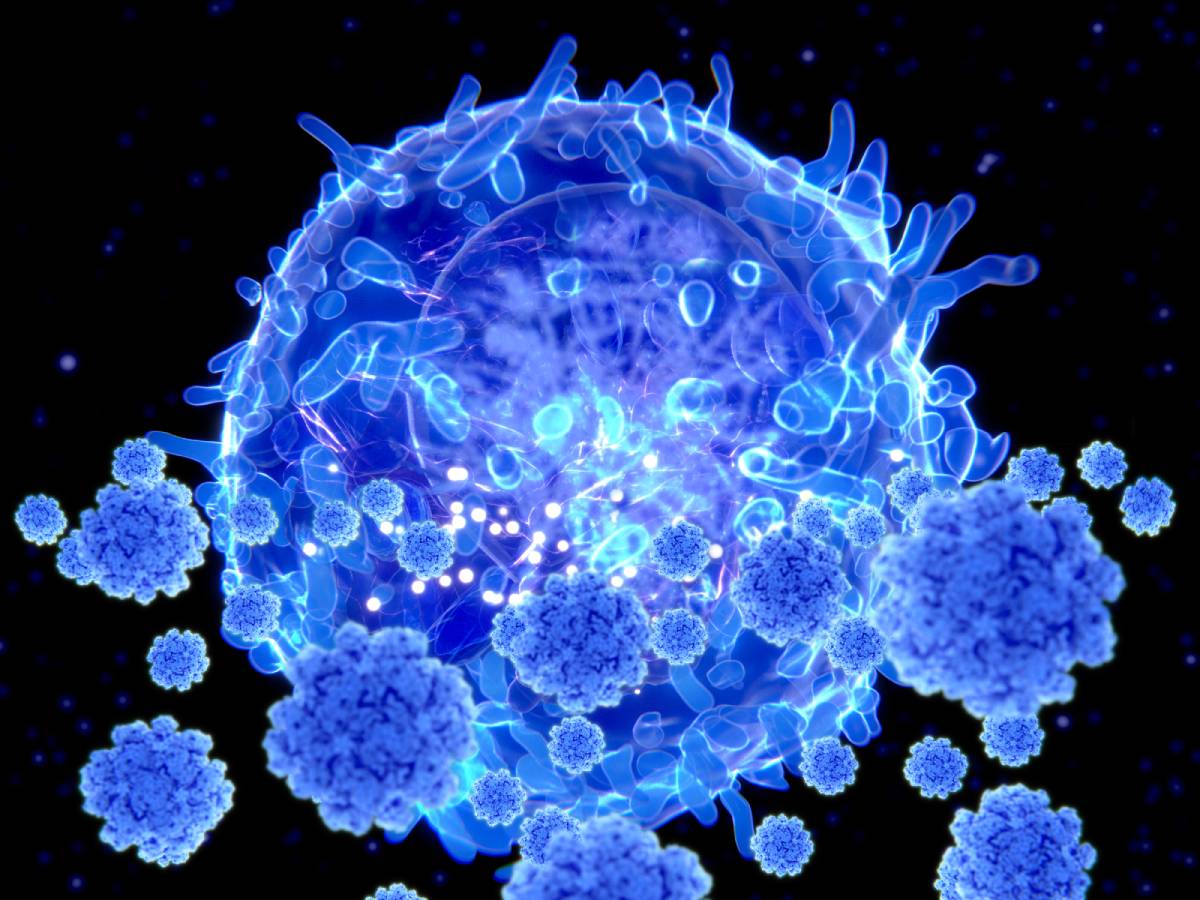
The Janus tyrosine kinase (JAK) family of proteins are cytoplasmic non-receptor tyrosine kinases that are expressed in all cells and are critical for development, immunity, and other cellular processes [1]. The four members of the JAK family – JAK1, JAK2, JAK3, and tyrosine kinase 2 (TYK2) – bind to and phosphorylate (activate) cytokine receptors, enabling the binding of signaling molecules such as those belonging to the signal transducer and activator of transcription (STAT) family [2]. The JAK-STAT pathway was first described in 1992 and borrows its name from Janus, the two-faced Roman god, on account of JAKs having two phosphate-transferring domains [3]. Now, Janus kinase inhibitors are being studied as treatment options for COVID-19.
The JAK-STAT pathway is active during the body’s immune response and leads to the production of proinflammatory cytokines. Cytokines, such as interleukins and tumor necrosis factors, target pathogens and recruit leukocytes to the site of infection/injury. However, the JAK-STAT pathway can become overactive in response to infection, causing cytokine release syndrome (CRS, known colloquially as a “cytokine storm”), a condition whereby the overproduction of cytokines may lead to sepsis and other life-threatening conditions [4]. CRS has been reported to occur in some patients with severe cases of COVID-19 [5], and inhibiting the JAK-STAT pathway thus represents one potential approach to limiting the immune overreaction inducted by COVID-19.
JAK inhibitors target at least one of the JAK family members and are used for several different immune-related complications. For example, the JAK inhibitor ruxolitinib binds to and inhibits JAK1 and JAK2 and is administered to patients with myelofibrosis and polycythemia [6]. Janus kinase inhibitors seem to also reduce the hyperinflammation caused by COVID-19. Several cases in the literature report that ruxolitinib reduces mortality in severe cases of COVID-19 [7]. Baricitinib, a JAK inhibitor that also interferes with JAK1 and JAK2 and is used to treat the effects of rheumatoid arthritis, has also found success in treating the inflammatory side-effects of COVID-19. Unlike ruxolitinib, baricitinib also binds the cyclin G-associated kinase, a protein that regulates endocytosis [8]. Endocytosis is the process by which the SARS-CoV-2 virus enters lung cells, which may allow baricitinib to prevent further infection of lung cells in COVID-19 patients.
To better quantify the efficacy of Janus kinase inhibitors like ruxolitinib and baricitinib in reducing hyperinflammation from COVID-19, several researchers have conducted analyses of data on administering JAK inhibitors to COVID-19 patients. Chen et al. found that both ruxolitinib and baricitinib reduced the use of invasive mechanical ventilation but did not affect the length of hospitalization or rates of ICU admission [5]. Wijaya et al. similarly found that JAK inhibitors (including ruxolitinib, baricitinib, tofacitinib, and fedracitinib) reduced mortality levels but not risk of clinical deterioration [9]. An analysis comparing the relative efficacy of the various JAK inhibitors has not yet been conducted, though the NIH recommends baricitinib or tofacitinib over the others due to trials that showed their efficacy [10].
Bruton’s tyrosine kinase (BTK) is a kinase that is involved in the development of B cells and cytokine receptor pathways. The NIH COVID-19 Treatment Panel currently recommends against BTK inhibitors due to insufficient data. BTK inhibitors include acalabrutinib, which is used to treat B-cell malignancies such as chronic lymphocytic leukemia [11], and ibrutinib, which prevents graft-versus-host disease in stem cell transplant patients [12]. Both also reduce the signaling associated with inflammation, making them promising research avenues in the search for additional COVID-19 therapeutics.
References
- Schonhofer, C., Coatsworth, H., Caicedo, P., Ocampo, C. & Lowenberger, C. Chapter 10 – Aedes aegypti Immune Responses to Dengue Virus. in Lessons in Immunity (eds. Ballarin, L. & Cammarata, M.) 129–143 (Academic Press, 2016). doi:10.1016/B978-0-12-803252-7.00010-2.
- Yamaoka, K. et al. The Janus kinases (Jaks). Genome Biol. 5, 253 (2004).
- Seif, F. et al. The role of JAK-STAT signaling pathway and its regulators in the fate of T helper cells. Cell Commun. Signal. 15, 23 (2017).
- Ragab, D., Salah Eldin, H., Taeimah, M., Khattab, R. & Salem, R. The COVID-19 Cytokine Storm; What We Know So Far. Front. Immunol. 11, 1446 (2020).
- Chen, C. et al. JAK-inhibitors for coronavirus disease-2019 (COVID-19): a meta-analysis. Leukemia 35, 2616–2620 (2021).
- PubChem. Ruxolitinib. https://pubchem.ncbi.nlm.nih.gov/compound/25126798.
- D’Alessio, A. et al. Low-dose ruxolitinib plus steroid in severe SARS-CoV-2 pneumonia. Leukemia 35, 635–638 (2021).
- Richardson, P. et al. Baricitinib as potential treatment for 2019-nCoV acute respiratory disease. Lancet Lond. Engl. 395, e30–e31 (2020).
- Wijaya, I. et al. The use of Janus Kinase inhibitors in hospitalized patients with COVID-19: Systematic review and meta-analysis. Clin. Epidemiol. Glob. Health 11, 100755 (2021).
- Kinase Inhibitors. COVID-19 Treatment Guidelines https://www.covid19treatmentguidelines.nih.gov/therapies/immunomodulators/kinase-inhibitors/.
- Owen, C., Berinstein, N. L., Christofides, A. & Sehn, L. H. Review of Bruton tyrosine kinase inhibitors for the treatment of relapsed or refractory mantle cell lymphoma. Curr. Oncol. Tor. Ont 26, e233–e240 (2019).
- Research, C. for D. E. and. FDA expands ibrutinib indications to chronic GVHD. FDA (2019).

